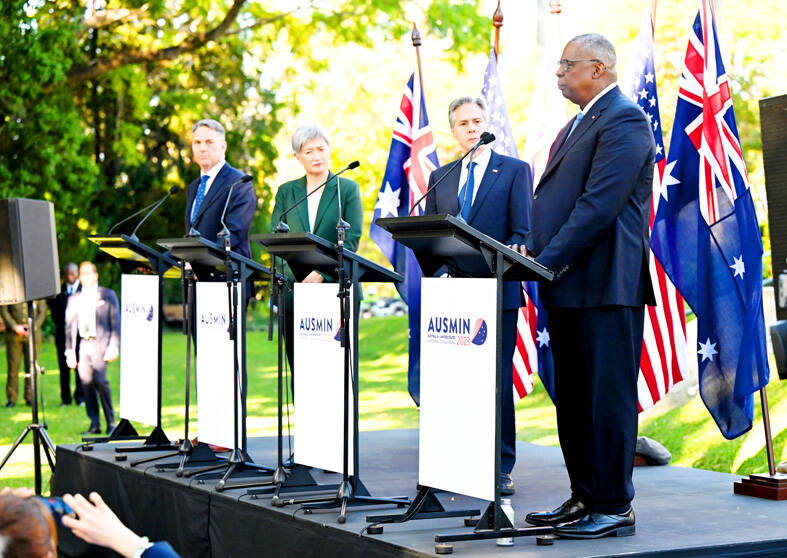The Ministry of Foreign Affairs (MOFA) yesterday thanked the US and Australia for reiterating the importance of cross-strait peace and stability and supporting Taiwan’s inclusion in international organizations.
US Secretary of State Antony Blinken and US Secretary of Defense Lloyd Austin, along with Australian Minister for Foreign Affairs Penny Wong (黃英賢) and Minister for Defence Richard Marles “reaffirmed the importance of maintaining peace and stability across the Taiwan Strait and their shared opposition to unilateral changes to the status quo” in a joint statement issued after the four met in Brisbane, Australia, for the Australia-United States Ministerial Consultations on Saturday.
Cross-strait issues should be resolved peacefully through dialogue, without the threat or use of force or coercion, the statement said.

Photo: EPA-EFE
As Taiwan is a leading economy and democracy in the Indo-Pacific region, the US and Australia reiterated their commitment to “work together to support Taiwan’s meaningful participation in international organizations, to deepen economic, trade and people-to-people ties,” it said, adding that they are “committed” to enhancing development coordination with Taiwan in the Pacific.
It also said they discussed deepening Quadrilateral Security Dialogue cooperation with India and Japan “in support of an open, stable, and prosperous Indo-Pacific.”
They also encouraged Beijing to “engage constructively with the United States and to take steps to promote stability and transparency,” it said.
In Taipei, the ministry expressed gratitude to Washington and Canberra for firmly supporting Taiwan in their joint statements.
The statements demonstrate that maintaining peace and stability across the Taiwan Strait has become an international consensus, the ministry said, adding that Taiwan plays a key role in the stability and prosperity of the Indo-Pacific region and the world.
In other news, the US Senate Committee on Finance announced its plan to prepare bipartisan tax legislation between the US and Taiwan when the US Congress reconvenes in September.
US Senate Committee on Finance Chairman Ron Wyden and US Senator Mike Crapo said in a statement released on Thursday that “we look forward to moving this legislation forward in a bipartisan manner.”
The statement refers to a discussion on drafting double taxation legislation between the US and Taiwan, which was proposed by Wyden and Crapo, together with US House of Representatives Committee on Ways and Means Chairman Jason Smith and US Representative Richard Neal on July 12.
The proposed bill would reduce withholding taxes on dividends, interest and royalties paid on US-Taiwan cross-border investments, and mitigate barriers for smaller businesses to make those investments, the House committee said in a news release.
Wyden and Crapo said that the committees had been working together to “find creative ways to promptly extend significant tax treaty-like benefits for American and Taiwanese workers and businesses operating across our borders.”
A lack of official relations with the US precludes Taiwan from entering into a formal tax treaty with it to resolve double taxation issues.
The committees completed collecting comments on the discussion draft on Monday last week.
Earlier this month, the US Senate Committee on Foreign Relations passed the Taiwan Tax Agreement Act, advocating for Washington to enter into negotiations with Taipei on the avoidance of double taxation.

CHAMPIONS: President Lai congratulated the players’ outstanding performance, cheering them for marking a new milestone in the nation’s baseball history Taiwan on Sunday won their first Little League Baseball World Series (LLBWS) title in 29 years, as Taipei’s Dong Yuan Elementary School defeated a team from Las Vegas 7-0 in the championship game in South Williamsport, Pennsylvania. It was Taiwan’s first championship in the annual tournament since 1996, ending a nearly three-decade drought. “It has been a very long time ... and we finally made it,” Taiwan manager Lai Min-nan (賴敏男) said after the game. Lai said he last managed a Dong Yuan team in at the South Williamsport in 2015, when they were eliminated after four games. “There is

Taiwan Semiconductor Manufacturing Co (TSMC, 台積電) is expected to start construction of its 1.4-nanometer chip manufacturing facilities at the Central Taiwan Science Park (CTSP, 中部科學園區) as early as October, the Chinese-language Liberty Times (the Taipei Times’ sister newspaper) reported yesterday, citing the park administration. TSMC acquired land for the second phase of the park’s expansion in Taichung in June. Large cement, construction and facility engineering companies in central Taiwan have reportedly been receiving bids for TSMC-related projects, the report said. Supply-chain firms estimated that the business opportunities for engineering, equipment and materials supply, and back-end packaging and testing could reach as high as

POWER PLANT POLL: The TPP said the number of ‘yes’ votes showed that the energy policy should be corrected, and the KMT said the result was a win for the people’s voice The government does not rule out advanced nuclear energy generation if it meets the government’s three prerequisites, President William Lai (賴清德) said last night after the number of votes in favor of restarting a nuclear power plant outnumbered the “no” votes in a referendum yesterday. The referendum failed to pass, despite getting more “yes” votes, as the Referendum Act (公民投票法) states that the vote would only pass if the votes in favor account for more than one-fourth of the total number of eligible voters and outnumber the opposing votes. Yesterday’s referendum question was: “Do you agree that the Ma-anshan Nuclear Power Plant

Democratic nations should refrain from attending China’s upcoming large-scale military parade, which Beijing could use to sow discord among democracies, Mainland Affairs Council Deputy Minister Shen You-chung (沈有忠) said. China is scheduled to stage the parade on Wednesday next week to mark the 80th anniversary of Japan’s surrender in World War II. The event is expected to mobilize tens of thousands of participants and prominently showcase China’s military hardware. Speaking at a symposium in Taichung on Thursday, Shen said that Chinese Minister of Foreign Affairs Wang Yi (王毅) recently met with Indian Prime Minister Narendra Modi during a visit to New Delhi.